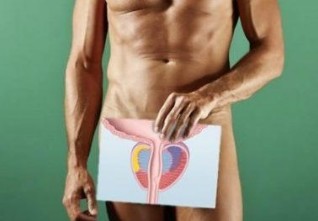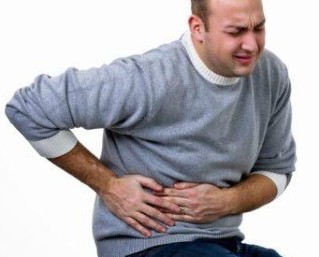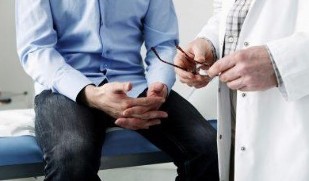Inflammation of the prostate – a serious disease that can lead to severe consequences if left untreated. The prostate is located below bladder.
If it's inflammation, it significantly increases in size, overlapping the cervix, bladder and prevents the outflow of urine. Therefore, when the first signs and manifestations, it is necessary to immediately consult a specialist to detect and start treatment, prostatitis.

Main symptoms: as manifested by prostatitis?
Previously it was believed that this disease in adult and elderly men, but in modern conditions of life (environment, food quality, fashion, carelessness of youth to their health, the constant car travel, etc.) inflammation of the prostate significantly "younger".
The incidence of young people under the age of 18 years is 5%, ranging in age from 18 to 30 years – 45%, from 30 to 50 years – 20%, more than 50 years – 30%. It talks about that keep an eye on your men's health and listen to the eyelashes, it is necessary from a young age.
There are several types of prostatitis on the form of expression (chronic, acute) and mean inflammation (bacterial, stagnant, festering, infectious, calculous). The symptoms of the disease is different, depending on the type of inflammation of the prostate gland in men.
Symptoms of acute prostatitis:
- ill-health (weakness, chills, fever). A person can start to throw then heat, then cold. The overall symptoms resemble the manifestation of SARS or the flu;
- a sharp increase in body temperature to low-grade signs (37,5-38 degrees) and higher;
- strong cutting, shooting pains in the area of the perineum (the area of the groin, anus, etc.);
- pain in the lower back, thighs, it gives on the feet, knees, soles of the feet or the leg muscles;
- acute pain occurs when the act of defecation, and straining;
- problems with urination (lack of / frequent urination, painful or difficult urination). Retention of urine for a longer period of time (more than 12 hours);
- deterioration of sexual function (weak or complete absence of erection, ejaculation, problems with conception);
- discharge from the genital organs (in the most severe and advanced cases of prostatitis).
Symptoms of chronic prostatitis:
- problems with urination (difficulty in urination, painful sensations, deficient discharge of urine, feeling of incomplete emptying of the bladder, etc.);
- uncomfortable nagging pain and discomfort in the groin, between the legs, in the groin, in the anus. A painful is not significant;
- in the groin can sometimes be a sharp pain or a feeling of a strong burning sensation, performs rotation in the groin;
- malaise for a long period of time (drowsiness, apathy, depressed state, constant fatigue, muscle weakness, etc.);
- nervousness, irritability;
- a slight increase in body temperature. Sometimes for a long time may remain a low-grade temperature;
- the decrease in sexual function, problems with erection, decreased or absent ejaculation, decreased libido, infertility, etc.).

Chronic in prostatitis includes such period of time as remission and relapse. In the period of relapse of the symptoms of the chronic form may result in symptoms of acute forms of the disease.
Symptoms of bacterial forms:
- the symptoms of the inflammatory process (fever, fever, increase in temperature, general weakness, pain syndrome in the muscles and bones);
- symptoms of local inflammation of the prostate gland (syndrome of pain in the groin, the groin, the rectum);
- problematic urination;
- change in consistency, color and odor of fluid (urine secret of the prostate gland, semen, blood).
The symptoms of the calculous form:
- weak and moderate painful back pain, sacral department, perineum, anus;
- drag pain and a burning sensation in the groin, the groin;
- pain significantly worse after intercourse and during active movement;
- problems with urination, feeling of fullness of the urinary bladder;
- decreased libido, problems with ejaculation and erection (up to erectile dysfunction);
- in advanced cases the semen may discover drops of blood (it becomes a pale pink or bright red).
Symptoms of congestive form:
- constant unpleasant sensations in the area of the groin, perineum and rectum;
- regular nagging pain in the groin area;
- problematic urination, a feeling that is not until the end of the inanis bladder;
- a persistent increase in temperature to the low-grade signs;
- manifestations of the overall inflammatory process in the body (elevated ESR in the blood, nausea, drowsiness, fatigue, headache, weakness, pain in the muscles, etc.);
- problems in the sexual sphere (the weak ejaculation and erection, infertility);
- anxious state, depressive state, apathy.
The symptoms of infectious forms:
- signs of inflammation in the body (increased value of ESR in the blood of men, muscle pain, increased body temperature);
- gnawing pain in the lower back, the groin and the perineum;
- pain during defecation;
- sharp pain in the groin and the perineum;
- problems with urination (difficulty in breathing, frequent urination, lack of desire, etc.).
The symptoms purulent form:
- sharp strong increase in body temperature (above 38, 5 degrees);
- the symptoms of the inflammatory process in the body (high values of ESR, muscle pain, fever, chills, etc.);
- significant painful, in the groin, the groin and the anus;
- sharp pain in the groin;
- difficulty with urination, painful urination;
- purulent discharge from the genital organs.
What are the first symptoms in men?
In the beginning of inflammation of the prostate gland in men can occur only part of the symptoms of the disease. Signs of incipient inflammation of the prostate gland, which is need to pay special attention to:

- discomfort in the groin;
- regular weak dragging pain in the groin and the perineum;
- drag unpleasant sensations in the rectum and the intestine in the faeces (in the absence of hemorrhoids);
- a long malaise, which is not associated with SARS, angina, flu and other cold diseases;
- decreased libido, disorders in ejaculation and erection (regular its absence);
- a reduction in the quality of orgasm;
- discomfort in the urethra and in the groin during sex or after the sexual intercourse;
- change in consistency, color and odor of semen;
- the increase in the temperature of the body.
Expressed symptoms of acute prostatitis:
- an increase in temperature to 37,5-40 degrees for no apparent reason (no colds, no flu, tonsillitis);
- frequency of urination increases 3-4 times and is accompanied by severe pain. Urine flows slowly and with a weak pressure;
- a burning sensation in the groin, the crotch, and during defecation. Pain in the intestine during the act of defecation;
- discharge of pus from the bowel or of the ureter (at the severe course and the purulent form of the disease).
Expressed symptoms of chronic inflammation of the prostate gland:
- a burning sensation in the groin and crotch. A burning sensation in the genitals (especially during urination and sex);
- purulent discharge from the urethra after urination and during stress (active movements or defecation). Purulent discharge from the rectum;
- nervousness, depressive state, irritability;
- quick fatigue without apparent cause, drowsiness.
Painful in inflammation of the prostate
Almost always when an inflammation of the prostate a man can himself learn about the causes of the appearance of the pain syndrome according to its nature. The characteristic of drag, gnawing, or sharp pain occurs in the groin and the groin. In the acute form, or when relapse of the chronic form of the disease the pains are characterized as sharp, sharp, severe, gnawing, cutting, and drag. In the chronic form of the disease the pains are regular, wavy character. Also painful may be weak, but steady. Inflamed prostate iron presses on the urethra, vulva, bladder and his ureters. To these channels the urine comes from the bladder, which may occur pain when urinating. Also pain while urination may be a sign of bladder infection or urinary and genitourinary system (disorder transmitted sexually transmitted diseases sexually transmitted DISEASES).
The accompanying pain may have a completely different cause of the occurrence. As well as the presence of several accompanying prostatitis pain can be quite inflammation of the prostate, and a variety of other diseases.
Other reasons accompanying pain:
- abdominal pains are a symptom of many other diseases. A prime example can serve as appendicitis, acute poisoning, intestinal infections or interfaith.
- The roast may be sick due to a hernia, degenerative disc disease, pinch points, nerve endings, osteoporosis, multiple sclerosis and other diseases of the spine.
- pain in the back alley can occur from hemorrhoids, fissures, bruising, prolonged sitting on an uncomfortable hard surfaces and a variety of tumors (benign or malignant).
- Painful sacral spine bears a more serious character. Most often it is problems with the bones, the vertebrae and discs (osteochondrosis, osteoporosis, offset, pinched, etc.).

Sometimes the same pain sacrum mean problems with other internal organs (kidneys, intestines, bladder, and ureters), gynecological diseases, thrombophlebitis, inflammation of the pelvic organs.
- Leg pain can mean a manifestation of flat feet, thrombophlebitis, atherosclerosis, varicose veins, arthritis, osteoporosis, inflammation of the sciatic nerve, and even diabetes. For pain in the feet can be many different reasons.
Most common – fatigue of feet and muscles from long-term physical activity.
What kind of specialist deals with the treatment of the disease?
Diagnose at the patient the inflammation of the prostate can only a qualified doctor – the urologist. Collects history and performs examination of the patient. Then he sends the man to the examination (PSA-antigen – protein for the identification of prostatitis) and ULTRASOUND examination of the pelvic organs.
Also patient, without exception, shall deliver the general analysis of blood and urine. On the basis of the results of all analyses carried out urologist can with accuracy determine the diagnosis and a form of inflammation of the prostate. Only after these procedures, the doctor may prescribe the patient's individual course of treatment, including drugs, antibiotics and other medicines that you take usually at home.
A man in 95% of cases, knows exactly what diagnosis will put a doctor-a urologist because of pain in the inflammation of the prostate is very specific. It is necessary to constantly listen to your body, keep track of all the changes that are happening with our body. Just so a man will be able in future years to maintain your men's health. Launched prostatitis is threatened not only the disorder of urination, but also problems of libido, ejaculation, erection, which ultimately can lead to infertility.
























